Robin Walker: Orchestral Music
The English composer Robin Walker (born in York in 1953) writes music which acknowledges nature as the paramount creative force. Working in a tradition which passes through Beethoven, Brahms, Elgar, Sibelius, Tippett and Birtwistle, he challenges the intellectual emphasis of modernism by channelling emotional energy into form, marrying subjective feeling and discipline in what he calls ‘passionate classicism’. This union of instinct and structure has created some of the most vigorous and exciting orchestral music of recent years, as the four powerful pieces on this CD demonstrate.
Novaya Rossiya Symphony Orchestra
Alexander Walker, conductor
Listen To This Recording:
- Great Rock is Dead: Funeral March (2007)
- Odysseus on Ogygia: Prelude (2011)
- The Stone King: Symphonic Poem (2005)
- The Stone Maker: Symphonic Poem (1996)
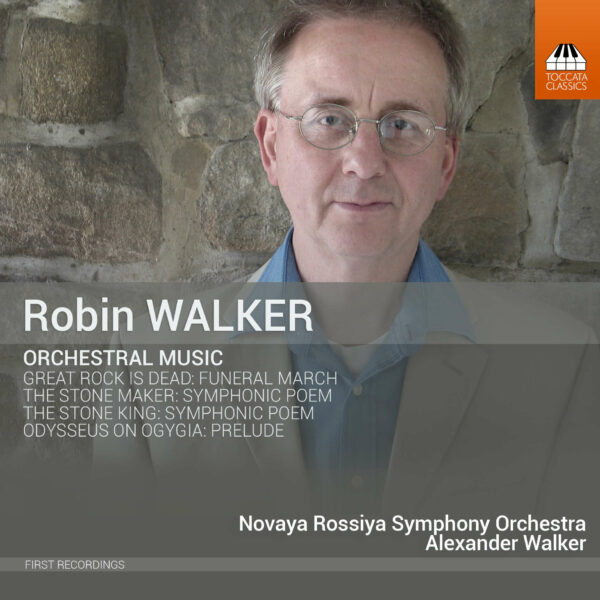
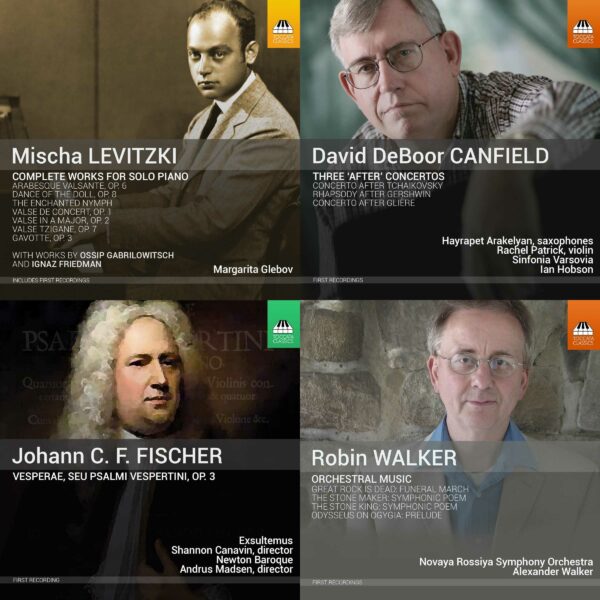
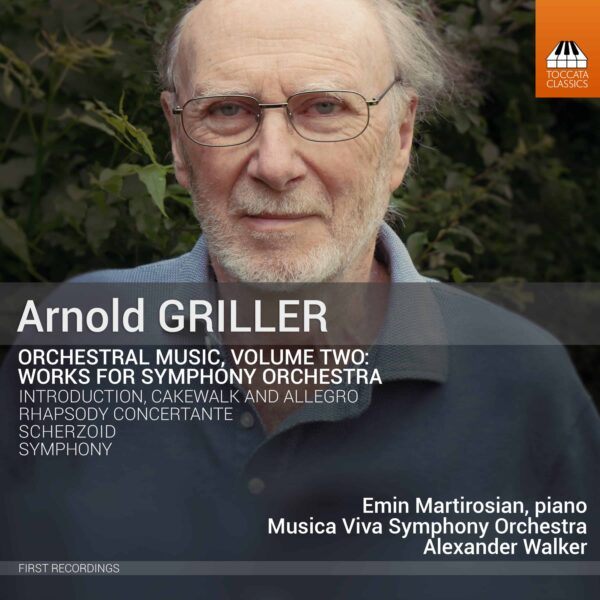
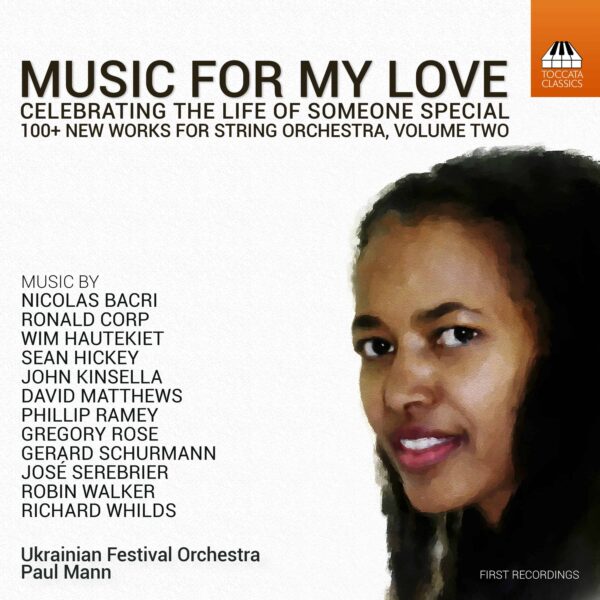
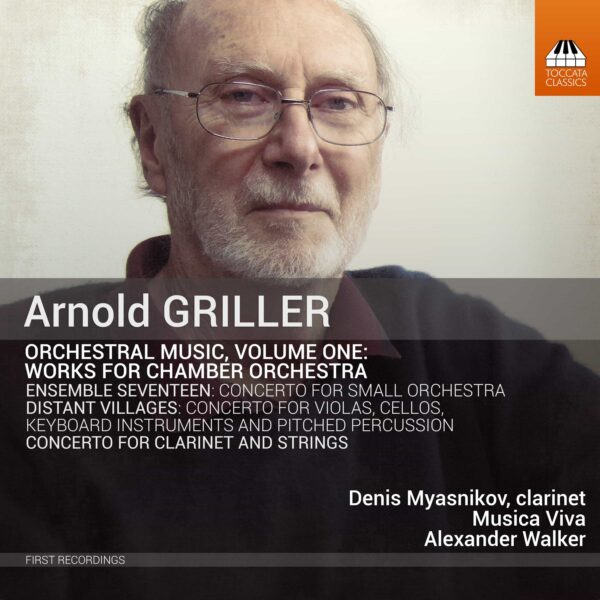
Patrick Waller :
This is certainly one of my records of 2016 and the most interesting new discovery for me in quite a while. As Rob Barnett points out in his review for MusicWeb International, there aren’t too many contemporary composers writing symphonic poems. So surely both the extended The Stone Maker (1996) and terse The Stone King (2005) must be amongst the finest examples around. They are impressively played and recorded, and their Nordic influences leave a deep impression. This is definitely worth snapping up and I hope Toccata will record more of Walker’s music.
Fanfare Magazine :
‘Why it took something this powerful and original this long to make its way into the recording studio is a perplexing mystery, but we should be grateful that it finally did. The “great rock” of Great Rock is Dead is the composer’s father, a World War II veteran… Lasting less than 10 minutes, the enormous weight and sweep of the piece makes it seem much larger than it is: a vast outpouring of grief and anger that feels like something that should be heard at Stonehenge. With its grinding brass and lumbering basses, the piece has a disturbing, atavistic quality that is also strangely exhilarating; in spite of its relatively brief length, by the time it ends—with a concluding series of cadences that the recall the closing bars of the opening movement of Bruckner’s Fourth Symphony—you feel you’ve been through a lot. … Wagner would also seem to inform much of the symphonic poem The Stone King from 2005, especially in its eloquent use of the euphonium… Whatever The Stone King’s autobiographical content might be, it’s a gripping 11 minutes that amply rewards repeated hearings. … The Stone Maker feels less like something someone composed than something which welled up from the rocks and trees, with huge blocks of sound forming, collapsing, and grinding into each other in a way that captures and retains the listener’s attention to the very end. Alexander Walker (no relation) and the Novaya Rossiya Symphony approach The Stone Maker—and indeed, all the works on the album—as though they’ve happened upon something extremely important, which it seems they most certainly have. … Robin Walker is one of those one-off, stand-alone, completely unclassifiable composers you’re constantly longing to meet but almost never do. Toccata Classics deserves our heart-felt thanks for making the introductions.’
—Jim Svejda, Fanfare, November/December 2016
MusicWeb International :
‘The first thing which might strike you about this CD is the fact that a composer … should have this first release of his orchestral music recorded by a little-known Russian orchestra. … This one, under the fine direction of Alexander Walker himself does the composer and the record company proud… To describe this music as beautiful would be hopelessly ambiguous. It has the beauty of the sometimes bleak Northern landscape and this is especially the case in The Stone Maker – Symphonic Poem. … In that he reminds me of Arthur Butterworth who used to find inspiration in walking the moors… Sibelius, who inspired Butterworth, also lies behind Walker’s music not just in its sounds but also in its organic growth. … As you can see I am much taken with this music. Of all the pieces I was most impressed with the shorter symphonic poem The Stone King. Its first part climaxes in an emotional collapse and the second is a resurrection back to what the composer calls ‘equilibrium’. Its length and shape are extremely well balanced and the material is of a high quality. It would be good to hear some of this music live or indeed any of Robin Walker’s works. Perhaps Toccata and Martin Anderson have plans for more, but even if they don’t the disc is well worth searching out. This music is worthy of your complete attention.’
—Gary Higginson, MusicWeb International
Robert R. Reilly :
I have had a brief history with one of the four compositions on this new CD. I know that sounds like I’m confessing to an affair. In a way, I am. Back in 2011 at a concert in London, I met Robin Walker in the company of English composer David Matthews, about whose music I intended to write (and did in Surprised by Beauty). As a consequence, I got to hear a private recording that Walker possessed of the 2009 premiere of the The Stone King, performed by the BBC Philharmonic, conducted by James MacMillan. As I subsequently discovered, this work indelibly impressed itself in my memory from my first exposure to it.
After long periods of not listening to it, I would detect a melody roaming through my head. All on its own, the music would slowly emerge from my unconscious or semiconscious state, and then slowly assert itself to the point where I would have to ask myself: what is that? I would then listen with closer attention and exclaim in recognition – The Stone King! I discovered that this work is so deeply embedded in my mind that it is always there at some level. I know this is a highly subjective judgment, but only extremely good music affects me in this way. How many compositions do that to you?
I became an advocate for this music. I wrote to the head of one of the largest classical music enterprises and asked him to listen to it. He did, and responded that it was, indeed, as I had promised, superb music. Next, he contacted his marketing people in Great Britain and was told that no one had heard of Walker, at least not to the extent that they could successfully market a CD of his music. In a vicious circle, the lack of Walker’s renown became the cause of his obscurity. Then to the rescue came Martin Anderson and Toccata Classics with this first all-Walker release. From it, I now have evidence that The Stone King was not a one-off, as the other works are of comparable quality.
Aside from a few comments, I am not going to analyze these four compositions separately because they are all of a piece; they share the same language and sound world, and even some thematic material. They develop differently, but offer aspects of the same thing. As Walker said in the notes, he “was undertaking something mythopoeic.” With his stone metaphors, he mythologizes some of the fundamental human experiences – the fathering of things, i.e. their creation against all odds (The Stone Maker); the nobility of the father, creator and sustainer (The Stone King); and the loss of the father (Great Rock Is Dead).
He states that these pieces “have been made out of a prevailing impulse to overcome…” And that is what we hear: the struggle to overcome and its achievement. Walker can sustain a musical span over an extraordinary length and build to a climax of stirring magnificence. Your heart will be in your mouth waiting for it. If you stay with this music, it will bring you to a level of exaltation. It achieves a Sibelian grandeur and conveys a deep sense of mystery.
Its orchestral language is inimitable. Massive brass yawps, chthonic guttural rumblings from the basses rend the earth, like sonic birth pangs, as if the earth, pregnant with some great revelation, is bringing forth a prodigious object, which slowly ascends, thrusts upward into the light and finally lets itself be seen in its full glory – a giant living stone monolith. This is visionary music of primordial utterances, breathtaking in its scope and visceral in its impact. It exposes vast horizons. It contains moments of delicacy but the tension never slackens nor is it ever less than monumental in stature. Sibelian swells roll through the music, which is draped with giant sheets of Nordic string sound. The music is infused with the spirit of Sibelius and sometimes even his sounds – especially so in Odysseus on Ogygia and The Stone King. It is therefore no surprise that Walker should say in the CD notes that, “I identify with Sibelius more than anybody else.” In Odysseus, the build to the first statement of the main theme and then its delivery are magnificent.
In The Stone King, orchestral balances are somewhat different from what I heard in the BBC recording. On the Toccata Classics, the ostinatos seem to be in front of the melodies instead of behind them. (It reminds me of the way Sergiu Celibidache interpreted Sibelius.) Of course, this could be merely a matter of the recording mix, rather than an interpretive stance. For sure, we hear a much greater wealth of orchestral detail than in the BBC version.
The Stone Maker is the single longest work at half an hour. It is also the earliest and the most roughly hewn in its wildness. The unleashing of what Walker calls “turbulent forces” in the first part of this composition is harrowing. In the violent tumult, it is as if the music is slamming up against itself. At other times, it sounds as if we are at Thor’s forge. It expresses a powerful sense of titanic struggle. Various leitmotifs and ostinatos seem to depict striking or chiseling stone. This is the only piece that I thought required recourse to the composer’s programme notes to understand exactly what is going on in its narrative. The others are musically self-explanatory.
David Fanning calls The Stone Maker “one of the outstanding achievements in British music of the 1990s.” Drop the appellation “British” and the temporal specificity, and I would not hesitate to claim the same anywhere for the other three compositions on this CD.
I don’t know how long conductor Alexander Walker (no relation) and the Novaya Rossiya Symphony Orchestra had to learn this challenging music, which they performed in the presence of the composer. It is so richly orchestrated and, in places, so tumultuous that it must take a feat of coordination to keep it together. But these forces do far more than that; they really lean into it with complete conviction and expressive power. The performances are thrilling. The Toccata Classics recording is stunning. The sheer physicality of the sound is close to overwhelming in its impact. You may need to put on your seat belt auditioning this.
Albeit within traditional tonal means, Walker is a man who has thought and heard things anew. He is a singular voice and has created a unique sound world. From listening to these four pieces, I have no doubt that I could easily identify a composition I had not heard before as his within a few bars.
How can anything this notable have been so long neglected? This CD release alone justifies the existence of Toccata Classics, which proves once again that it is indispensable. May there be many more Robin Walker releases.
Robert R. Reilly
MusicWeb International :
‘I don’t know how long conductor Alexander Walker (no relation) and the Novaya Rossiya Symphony Orchestra had to learn this challenging music, which they performed in the presence of the composer. It is so richly orchestrated and, in places, so tumultuous that it must take a feat of coordination to keep it together. In any event these forces do far more than that; they really lean into it with complete conviction and expressive power. The performances are thrilling. The Toccata Classics recording is stunning. The sheer physicality of the sound is close to overwhelming in its impact. You may need to put on your seat-belt auditioning this.
Albeit within traditional tonal means, Walker is a man who has thought and heard things anew. He is a singular voice and has created a unique sound-world. From listening to these four pieces, I have no doubt that I could easily identify a composition I had not heard before as his within a few bars.
How can anything this notable have been so long neglected? This CD release alone justifies the existence of Toccata Classics, which proves once again that it is indispensable. May there be many more Robin Walker releases.’
—Robert R. Reilly, MusicWeb International
The Classical Reviewer :
‘I find it hard to imagine any listener not getting caught up in the thrall of Robin Walker’s orchestral works on a new release from Toccata Classics. […]
[The Stone King: Symphonic Poem] is a fabulous work. […]
[The Stone Maker: Symphonic Poem] is a sprawling yet totally engrossing work. Walker seems to have thrown all his experience at the time of its composition into this work which is of symphonic proportions. This is a remarkable work. […]
I find it hard to imagine any listener not getting caught up in the thrall of these works that are full of fire and drama and, in the case of the three later works, beautifully constructed.
The Novaya Rossiya Symphony Orchestra under Alexander Walker brings terrific performances and they are finely recorded in Studio 5, Russian State TV and Radio Company Kultura, Moscow. There are excellent booklet notes that take the form of an interview with Robin Walker and notes on the music by the composer’
—Bruce Reader, The Classical Reviewer
MusicWeb International :
‘The Stone King is a short symphonic poem. As it turns out it serves as an object lesson in fine recording quality with the growl of the deep brass nicely barked out from the right-hand channel. A growling truculence is one of the hallmarks of Robin Walker’s music and Alexander Walker and the Novaya Rossiya orchestra do nothing to dilute it.’
—Rob Barnett, MusicWeb International
The Ultimate Classical Music Guide by Dave Hurwitz :
‘[These are] some really powerful and interesting orchestral music by the British composer, Robin Walker. […]
This is really good music. Interesting music.
[these pieces] are viscerally powerful. […]
What we have are three very gripping, powerful, sort of inexorably monolithic orchestral works which are wonderfully played and very, very well recorded. […]
Odysseus on Ogygia is really beautiful. […] it’s absolutely lovely. It has beautiful woodwind writing and really poignant and effecting harmony. […] I enjoyed it very much. […]
This is really powerful and effecting music. And enjoyable and wonderfully played and recorded. So I recommend it to you also. […] I found this to be quite a discovery.’
—David Hurwitz, The Ultimate Classical Music Guide by Dave Hurwitz
Arcana.FM :
‘Is it recommended?
Indeed, especially given these performances are so attuned to its essence. Alexander Walker secures a committed response from the Novaya Rossiya Symphony Orchestra, which is heard to advantage in a recorded ambience that amply brings out the filmic opulence of this music.’
—Richard Whitehouse, Arcana.FM